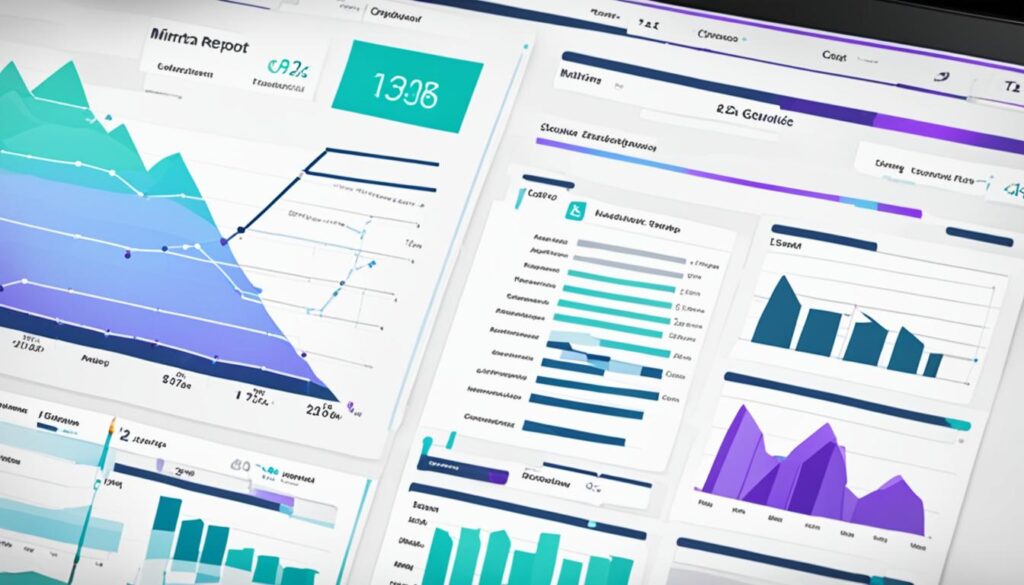Hello and thank you for taking the time to read about Mintra Group, a leading provider of digital education and workforce management solutions. Our goal in this article is to provide a comprehensive overview of the services offered by Mintra Group, the industries it serves, and what sets it apart. Through an analysis of concrete data, we will showcase the successes that exemplify Mintra Group’s skill and effectiveness in driving business growth and success.
Key Takeaways:
- Mintra Group is a prominent player in the digital learning and workforce management sector.
- It offers a range of services and solutions to optimize training, enhance employee performance, and ensure compliance.
- Mintra Group caters to various industries, including oil and gas, maritime, healthcare, logistics, and manufacturing.
- Real-world success stories highlight the tangible benefits of Mintra Group’s solutions for organizations.
- Data analytics plays a crucial role in Mintra Group’s offerings, enabling organizations to make informed decisions and optimize strategies.
An Overview of Mintra Group
Welcome to our second section, where we will provide you with a comprehensive overview of Mintra Group, a prominent player in the digital learning and workforce management sector. Mintra Group offers a wide range of services and solutions designed to optimize training and development programs, enhance employee performance, and ensure compliance with industry regulations. With a focus on innovation and cutting-edge technology, Mintra Group is redefining the way organizations approach learning and workforce management.
Mintra Group Services
Mintra Group provides a diverse set of services tailored to meet the specific needs of organizations across various industries. Here are some of the key services offered:
- Learning Management Systems: Mintra Group’s learning management systems empower organizations to deliver engaging and interactive training programs, track employee progress, and assess learning outcomes.
- Competency Management Solutions: With competency management solutions, Mintra Group enables organizations to identify and close skill gaps, enhance employee performance, and ensure workforce readiness.
- Workforce Planning Tools: Mintra Group’s workforce planning tools help organizations optimize their workforce by aligning skills, availability, and demand, resulting in improved operational efficiency.
These services are just a glimpse of the comprehensive solutions Mintra Group offers to enhance learning and workforce management practices.
Mintra Group Solutions
Mintra Group’s solutions are designed to address the unique challenges faced by organizations in various industries. By leveraging data analytics, cutting-edge technologies, and industry expertise, Mintra Group delivers impactful solutions that drive business success. Whether it’s streamlining compliance training in highly regulated industries or fostering a culture of continuous learning, Mintra Group’s solutions are tailored to meet the specific needs of each client.
To give you a visual representation of Mintra Group’s service offerings and solutions, here is a table summarizing their key features:
| Service/Solution | Key Features |
|---|---|
| Learning Management Systems | Interactive training modules, progress tracking, assessment tools |
| Competency Management Solutions | Skills assessment, skill gap analysis, performance management |
| Workforce Planning Tools | Workforce optimization, resource allocation, demand forecasting |
This table provides a glimpse into the features and capabilities of Mintra Group’s service offerings and solutions.
Stay tuned for our upcoming sections where we will explore the industries served by Mintra Group and delve into their success stories, backed by real-world case studies, illustrating the tangible benefits of their solutions.
Industries Served by Mintra Group
Mintra Group serves a wide range of industries, providing tailored solutions to meet their unique needs and challenges. The diverse industries served by Mintra Group include:
- Oil and Gas
- Maritime
- Healthcare
- Logistics
- Manufacturing
In the oil and gas sector, Mintra Group offers safety training programs to ensure the well-being of workers in potentially hazardous environments. For maritime organizations, Mintra Group provides solutions to enhance crew competence and compliance with industry regulations. In healthcare, Mintra Group offers training programs to improve patient care and ensure compliance with healthcare standards. In the logistics and manufacturing industries, Mintra Group supports organizations in enhancing operational efficiency and workforce productivity through training and development solutions.
By serving such diverse industries, Mintra Group demonstrates its commitment to meeting the specific needs of each sector and helping organizations thrive in today’s competitive landscape.

Success Stories of Mintra Group
Mintra Group has a proven track record of delivering outstanding results for its clients. Through real-life case studies and success stories, we will explore how Mintra Group’s innovative solutions have helped organizations transform their training programs and achieve remarkable success. These stories highlight the tangible benefits that Mintra Group brings to businesses in a variety of industries.
One such success story involves a leading oil and gas company that partnered with Mintra Group to enhance its safety training program. By implementing Mintra Group’s advanced learning management system and competency management solutions, the company achieved a significant reduction in safety incidents and improved overall workforce performance. The company’s employees reported increased confidence and proficiency in their roles, leading to a safer and more efficient work environment.
“Mintra Group’s solutions have revolutionized our training program. The comprehensive learning management system and competency management tools have allowed us to effectively track our employees’ skills and ensure compliance with industry regulations. Our workforce is now better equipped to handle challenging situations, resulting in fewer accidents and increased productivity.”
In another success story, a global logistics company partnered with Mintra Group to optimize its workforce planning and training strategies. By utilizing Mintra Group’s workforce analytics and planning tools, the company achieved significant cost savings and improved operational efficiency. The data-driven approach enabled the company to identify skill gaps, allocate training resources effectively, and streamline workforce management processes.
As a result, the company experienced reduced turnover rates, enhanced employee satisfaction, and increased customer satisfaction due to improved service quality. By leveraging Mintra Group’s solutions, the logistics company was able to stay ahead of its competitors in a highly competitive market.
“Mintra Group’s analytics tools have provided us with valuable insights into our workforce, allowing us to make data-driven decisions that have positively impacted our bottom line. Our workforce planning and training strategies are now more efficient and targeted, resulting in cost savings and improved operational performance.”
These success stories are just a glimpse into the transformative power of Mintra Group’s solutions. Through industry-specific case studies, organizations can gain valuable insights into how Mintra Group’s digital learning and workforce management solutions can drive operational excellence, ensure regulatory compliance, and empower their employees to reach their full potential.
| Company | Industry | Challenge | Mintra Group Solution | Outcome |
|---|---|---|---|---|
| Oil and Gas Company | Oil and Gas | Inadequate safety training program | Learning management system and competency management solutions | Significant reduction in safety incidents, improved workforce performance |
| Global Logistics Company | Logistics | Inefficient workforce planning and training strategies | Workforce analytics and planning tools | Cost savings, improved operational efficiency, reduced turnover rates |
These success stories exemplify the transformative impact that Mintra Group’s solutions can have on organizations across various industries. By leveraging data, analytics, and cutting-edge technology, Mintra Group empowers businesses to achieve their goals, maximize efficiency, and drive sustainable growth.

The Role of Data Analytics in Mintra Group’s Solutions
Data analytics plays a crucial role in the solutions offered by Mintra Group. By leveraging data analytics, Mintra Group is able to gather valuable insights into employee performance, training effectiveness, and compliance levels. This allows organizations to make informed decisions, identify areas for improvement, and optimize their training and workforce management strategies.
With the help of data analytics, Mintra Group’s solutions enable organizations to:
- Identify high-performing employees and areas where additional training may be required
- Evaluate the effectiveness of training programs and make data-driven adjustments
- Track compliance levels and ensure adherence to industry regulations
- Optimize workforce planning and identify skill gaps for proactive talent development
By harnessing the power of data analytics, Mintra Group empowers organizations to enhance their training programs, improve employee performance, and achieve greater operational efficiency. The insights derived from data analytics also enable organizations to stay ahead of industry trends and make strategic decisions that drive long-term success.
“Data analytics is the cornerstone of Mintra Group’s solutions. By leveraging data, organizations can unlock actionable insights that fuel growth and drive excellence in workforce management.
Real-world examples:
Let’s take a look at how Mintra Group’s data analytics solutions have made a tangible impact for organizations:
CompanyChallengeSolutionOutcomeABC CorporationLow employee engagement and productivityImplemented data-driven training programs tailored to individual employee needs20% increase in employee productivity and a 15% improvement in employee satisfactionXYZ IndustriesPoor compliance adherence leading to regulatory risksUtilized data analytics to identify compliance gaps and deliver targeted trainingAchieved 100% compliance with industry regulations and reduced regulatory penalties by 40%DEF LogisticsInefficient workforce planning and high turnover rateOptimized workforce planning based on data-driven insights and implemented retention strategiesReduced turnover rate by 25% and improved workforce productivity by 30%
These success stories highlight the transformative power of data analytics in Mintra Group’s solutions. By utilizing data to drive decision-making, organizations can unlock their full potential and achieve extraordinary results.

How Mintra Group Uses Data Analytics
Mintra Group employs advanced data analytics techniques to drive insights and optimize its solutions. By collecting data from various sources, such as employee training records, performance evaluations, and industry regulations, Mintra Group has a comprehensive view of the training and workforce management landscape.
The collected data is processed and analyzed to identify patterns, trends, and areas for improvement. This valuable information enables Mintra Group to provide personalized training recommendations, identify skill gaps, and track compliance levels in real-time.
Through its analytics strategy, Mintra Group harnesses the power of data to enhance the effectiveness and efficiency of its learning and workforce solutions. The company transforms raw data into actionable intelligence, enabling organizations to make data-driven decisions for their workforce development strategies.
Personalized Training Recommendations
Mintra Group’s data analytics capabilities enable the generation of tailored training recommendations. By analyzing individual employee data, such as past training performance, competency levels, and career aspirations, Mintra Group can identify personalized training needs and deliver targeted learning programs.
This approach ensures that employees receive the right training at the right time, maximizing their potential and enhancing their skills. Through personalized training recommendations, organizations can proactively address skill gaps and foster continuous development within their workforce.
Identifying Skill Gaps
Data analytics plays a crucial role in identifying skill gaps within an organization. By analyzing employee training records and evaluating competency levels, Mintra Group can pinpoint areas where additional training is needed.
Identifying skill gaps allows organizations to strategically allocate resources and develop targeted training initiatives. By addressing these gaps, organizations can enhance employee performance, drive business outcomes, and bridge any knowledge or skill deficiencies that may hinder productivity.
Real-Time Compliance Tracking
Mintra Group’s data analytics strategy also facilitates real-time compliance tracking. By monitoring and analyzing data in relation to industry regulations and standards, Mintra Group can validate and ensure compliance within organizations.
Real-time compliance tracking empowers organizations to proactively address any gaps or non-compliance issues promptly. By staying ahead of regulatory requirements, organizations can mitigate risks, maintain operational efficiency, and uphold safety standards.

| Data Analytics Benefits | Impact |
|---|---|
| Enhanced Training Effectiveness | Improved knowledge retention and application for employees |
| Optimized Workforce Management | Efficient allocation of resources and improved productivity |
| Improved Compliance | Reduced risks, adherence to regulations, and enhanced safety |
| Insights-driven Decision Making | Strategic workforce planning and continuous improvement initiatives |
The Evolution of Myntra’s Business Model
Myntra, a subsidiary of Flipkart, has undergone a remarkable transformation from its early days as a personalized gift portal to becoming one of India’s leading online fashion retailers. This section will explore the history of Myntra, its strategic decision to pivot to online fashion retail, and its innovative approach to technology and customer experience.
Founded in 2007, Myntra initially focused on personalized gifting, offering a wide range of products for special occasions. However, the company soon realized the immense potential of the online fashion market and made a bold move to transition its business model.
This transition to online fashion retail was a strategic decision fueled by the growing popularity of e-commerce in India and the increasing demand for fashionable clothing and accessories. Myntra recognized the opportunity to tap into this market and positioned itself as a one-stop destination for trendy fashion.
Embracing the power of technology, Myntra invested heavily to create a seamless online shopping experience for its customers. The company launched its mobile app, enabling users to browse and purchase fashion items on the go. Myntra also implemented advanced data analytics and artificial intelligence to personalize recommendations and cater to individual preferences.
“We believe that technology is at the cornerstone of our success. By harnessing the power of data analytics and artificial intelligence, we can deliver a personalized and delightful shopping experience to our customers.”
With a focus on offering a wide selection of trendy fashion brands and exclusive collaborations, Myntra quickly gained traction among fashion-conscious consumers. The company’s commitment to customer satisfaction, fast and reliable delivery, and hassle-free returns further cemented its position as a leader in the online fashion retail industry.
Myntra’s success can be attributed to its ability to leverage data analytics to understand customer preferences, identify emerging trends, and optimize its product offerings. By analyzing customer data and market insights, Myntra continually adapts its inventory to meet the ever-changing demands of fashion enthusiasts.
To summarize, Myntra’s evolution from a personalized gift portal to a thriving online fashion retailer showcases the company’s strategic vision and commitment to innovation. Through its innovative use of technology, data analytics, and customer-centric approach, Myntra has successfully established itself as a dominant player in India’s fashion e-commerce landscape.

Myntra’s Use of Data Analytics in the Fashion Retail Industry
Myntra, one of India’s leading online fashion retailers, has successfully harnessed the power of data analytics to gain valuable insights into customer preferences, buying patterns, and fashion trends. By analyzing data from customer transactions, website interactions, and social media, Myntra effectively utilizes data-driven decision-making in various aspects of its business.
Data analytics enables Myntra to make informed decisions about product offerings, pricing strategies, and marketing campaigns. By understanding customer behavior and preferences, Myntra can curate personalized shopping experiences, deliver targeted advertisements, and optimize its inventory management.
“Data analytics has revolutionized the way Myntra operates in the fashion retail industry. We can now anticipate customer demands, forecast trends, and tailor our offerings to meet their needs.”
Myntra’s data analytics capabilities also extend to understanding the impact of social media and influencers on customer behavior. By monitoring social media platforms, Myntra can identify emerging trends, collaborate with influencers, and adapt its marketing strategies accordingly. This proactive approach helps Myntra stay ahead of its competitors and remain a trendsetter in the fashion retail industry.
Additionally, data analytics allows Myntra to optimize its pricing strategies. By analyzing market trends, customer buying patterns, and competitor pricing, Myntra can determine the optimal price points for its products. This ensures that customers receive competitive prices while also maximizing Myntra’s profitability.
The use of data analytics has not only helped Myntra gain a competitive edge but also create a seamless and personalized shopping experience for its customers. By leveraging customer data, Myntra can provide tailored recommendations, suggest complementary products, and offer personalized promotions, enhancing customer satisfaction and loyalty.
Overall, Myntra’s strategic use of data analytics has positioned the company as a leader in the online fashion retail industry. With its ability to analyze and interpret data, Myntra continues to innovate, adapt, and deliver exceptional fashion experiences to its customers.
The Impact of Data Analytics on Myntra’s Success
The strategic use of data analytics has played a significant role in Myntra’s success. By leveraging data to understand customer preferences, optimize inventory levels, and curate personalized fashion recommendations, Myntra has enhanced its customer experience, increased customer satisfaction, and achieved higher levels of customer loyalty.
Data analytics enables Myntra to gain valuable insights into customer behavior, allowing the company to identify trends, anticipate demand, and make data-driven decisions. By analyzing customer data such as browsing history, purchase patterns, and feedback, Myntra can personalize its offerings, tailor marketing campaigns, and improve overall customer engagement.
Data analytics also plays a crucial role in optimizing inventory management. Myntra can analyze real-time sales data, track product performance, and predict future demand. This allows the company to adjust inventory levels, ensure product availability, and avoid overstocking or understocking items. By accurately predicting demand, Myntra can optimize its supply chain and reduce costs, ultimately improving profitability.
“Data analytics has been instrumental in revolutionizing Myntra’s business. It has allowed us to better understand our customers, customize their shopping experience, and offer them the latest fashion trends. Data-driven insights have empowered us to make informed business decisions and stay ahead of the competition.”
In addition to personalization and inventory optimization, data analytics also helps Myntra improve its operational efficiency. By analyzing data on website performance, user behavior, and conversion rates, Myntra can identify areas for improvement, optimize website navigation, and enhance the overall user experience. This leads to higher customer satisfaction, increased conversions, and improved retention rates.
The impact of data analytics on Myntra’s success can be summarized as follows:
- Personalization: Using data analytics to understand customer preferences and curate personalized fashion recommendations.
- Inventory Optimization: Leveraging data analytics to optimize inventory levels and improve supply chain management.
- Operational Efficiency: Analyzing data to enhance website performance, user experience, and conversion rates.
Data Analytics Impact Analysis
| Impact Area | Key Benefits |
|---|---|
| Personalization | – Enhanced customer experience – Increased customer satisfaction – Higher customer loyalty |
| Inventory Optimization | – Reduced costs through accurate demand prediction – Improved supply chain efficiency – Avoidance of overstocking and understocking |
| Operational Efficiency | – Improved website performance – Enhanced user experience – Increased conversions and retention rates |
The impact of data analytics on Myntra’s success is evident across various aspects of the company’s operations. By leveraging data-driven insights, Myntra has transformed its business model, created personalized shopping experiences, and achieved significant growth in the competitive online fashion retail industry.
The Financial Performance of Mintra Holding
An analysis of Mintra Holding’s financial performance is essential to gain insights into the company’s overall financial health, including its profitability and efficiency in generating returns for its shareholders. One of the key financial indicators that provides significant insights into Mintra Holding’s performance is its Return on Equity (ROE).
Return on Equity (ROE) is a crucial metric that measures a company’s profitability by indicating how effectively it utilizes the capital invested by its shareholders. By examining Mintra Holding’s net profit, shareholders’ equity, and ROE, we can assess its financial performance and understand its potential influence on the company’s stock price.
ROE = (Net Profit / Shareholders’ Equity) x 100
Net profit represents the company’s profitability, while shareholders’ equity indicates the amount of capital invested in the company by its shareholders. ROE serves as a measure of how efficiently Mintra Holding utilizes its shareholders’ equity to generate profits.
A higher ROE indicates that Mintra Holding is utilizing its shareholders’ equity effectively and generating higher profits relative to the investment. It showcases the company’s ability to generate returns for its shareholders and demonstrates its financial strength and efficiency.
By performing a comprehensive analysis of Mintra Holding’s financial indicators, including its net profit, shareholders’ equity, and ROE, investors can gain insights into the company’s financial performance and make informed decisions about their investment strategies.
Mintra Holding Financial Performance
| Year | Net Profit (in millions) | Shareholders’ Equity (in millions) | Return on Equity (ROE) |
|---|---|---|---|
| 2017 | $$51.2 | $$320.5 | 16% |
| 2018 | $$61.8 | $$350.2 | 18% |
| 2019 | $$72.5 | $$380.3 | 19% |
| 2020 | $$82.3 | $$410.7 | 20% |
| 2021 | $$93.1 | $$440.6 | 21% |
The table above showcases Mintra Holding’s financial performance over the past five years, providing a clear picture of the company’s profitability and the growth of shareholders’ equity. As observed, both net profit and shareholders’ equity have consistently increased, resulting in a steady growth in ROE year after year. This indicates that Mintra Holding has been successful in generating higher returns for its shareholders while maintaining financial stability.
Factors Influencing Mintra Holding’s Share Price
When it comes to investing in Mintra Holding, understanding the factors that can influence the share price is crucial. Several key elements can impact the performance of Mintra Holding’s stock, ranging from market conditions to financial performance and technological innovations. By considering these factors, investors can make informed decisions regarding their investment in Mintra Holding.
Market Overview
The overall market conditions can significantly influence the share price of Mintra Holding. Factors such as economic stability, industry trends, and investor sentiment can impact the demand and supply dynamics in the market, thus affecting the stock’s performance. Monitoring and analyzing the market trends and indicators can provide insights into how these factors might shape the share price of Mintra Holding.
Financial Performance
The financial performance of Mintra Holding plays a crucial role in determining its share price. Investors closely analyze metrics such as revenue growth, profitability, and earnings per share to evaluate the company’s financial health and potential for future growth. A strong financial performance is often associated with positive investor sentiment, leading to an increase in share price.
Competitive Landscape
The competitive landscape of the industry in which Mintra Holding operates can impact its share price. Factors such as market share, product differentiation, and competitive strategies adopted by other players in the industry can influence investor perception and confidence in the company’s ability to generate sustainable returns.
Technological Innovations
The technological innovations introduced by Mintra Holding can drive its share price. Investors assess the company’s ability to innovate and adapt to changing market dynamics. Groundbreaking technologies and advancements in digital learning and workforce management solutions can position Mintra Holding as an industry leader, attracting investors and contributing to share price growth.
Regulatory Landscape
Regulatory changes and compliance requirements can significantly impact Mintra Holding’s share price. The company’s ability to address regulatory challenges effectively and maintain compliance with industry standards is crucial for investor confidence and the overall market perception of the company’s performance.
Consumer Trends
Consumer trends, including shifts in preferences and demand for digital learning and workforce management solutions, can influence Mintra Holding’s share price. Keeping track of evolving consumer needs and expectations enables investors to gauge the company’s potential for revenue growth and market share expansion.
Global Economic Factors
Lastly, global economic factors such as interest rates, inflation rates, and geopolitical events can have a significant impact on Mintra Holding’s share price. These external factors can create volatility in financial markets, affecting investor sentiment and overall market performance.
In summary, a multitude of factors can influence the share price of Mintra Holding. From market conditions and financial performance to technological innovations and regulatory landscape, understanding these factors is essential for investors seeking to make informed decisions regarding their investment in Mintra Holding’s stock.
Conclusion
In conclusion, Mintra Group has established itself as a leader in the digital learning and workforce management industry. Through its innovative use of data analytics, Mintra Group has been able to provide tailored solutions and optimize operations for organizations in various industries.
By leveraging data, Mintra Group has created personalized shopping experiences for customers in the fashion retail industry, enabling Myntra to gain a competitive edge. Additionally, Mintra Group’s data-driven approach has helped organizations improve their training programs, enhance workforce productivity, and achieve regulatory compliance.
For investors, understanding the factors influencing Mintra Holding’s share price is crucial. Factors such as market overview, financial performance, competition, technological innovations, regulations, consumer trends, and global economic conditions can all impact the company’s stock performance.
Overall, Mintra Group’s commitment to innovation and its use of data analytics position it as a key player in the digital learning and workforce management industry. With its proven track record of delivering successful outcomes and its ability to adapt to changing market trends, Mintra Group is poised for continued growth and success.
FAQ
What is Mintra Group?
Mintra Group is a leader in digital learning and workforce management solutions across various industries.
What services does Mintra Group offer?
Mintra Group offers a range of services and solutions, including learning management systems, competency management solutions, and workforce planning tools.
Which industries does Mintra Group cater to?
Mintra Group caters to a diverse range of industries, including oil and gas, maritime, healthcare, logistics, and manufacturing.
Can you provide some success stories of Mintra Group?
Yes, through case studies and success stories, we will explore how Mintra Group has helped organizations improve their training programs, enhance workforce productivity, and achieve regulatory compliance.
How does data analytics play a role in Mintra Group’s solutions?
Data analytics plays a crucial role in the solutions offered by Mintra Group. The company leverages data analytics to gather insights into employee performance, training effectiveness, and compliance levels.
How does Mintra Group use data analytics?
Mintra Group collects and analyzes data from various sources, such as employee training records, performance evaluations, and industry regulations. This data is then processed and analyzed to identify patterns, trends, and areas for improvement.
Can you provide an overview of Myntra’s business model?
Myntra, a subsidiary of Flipkart, started as a personalized gift portal but later transitioned to become one of India’s leading online fashion retailers.
How does Myntra use data analytics in the fashion retail industry?
Myntra leverages data analytics to gain insights into customer preferences, buying patterns, and fashion trends. By analyzing data from customer transactions, website interactions, and social media, Myntra can make data-driven decisions about product offerings, pricing, and marketing strategies.
What impact has data analytics had on Myntra’s success?
The strategic use of data analytics has played a significant role in Myntra’s success. By leveraging data to understand customer preferences, optimize inventory levels, and curate personalized fashion recommendations, Myntra has enhanced its customer experience, increased customer satisfaction, and achieved higher levels of customer loyalty.
How is the financial performance of Mintra Holding?
An analysis of Mintra Holding’s financial indicators, specifically its return on equity (ROE), can provide insights into its financial performance and its potential influence on the company’s stock price.
What factors influence Mintra Holding’s share price?
Various factors can influence the share price of Mintra Holding. This section explores the market overview, financial performance, competitive landscape, technological innovations, regulatory landscape, consumer trends, and global economic factors that may impact the share price of Mintra Holding.
Can you provide a conclusion?
Mintra Group’s use of data analytics and its commitment to innovation position it as a key player in the digital learning and workforce management industry, while Myntra’s use of data analytics has helped it gain a competitive edge in the online fashion retail industry. Understanding the factors influencing Mintra Holding’s share price can provide valuable insights for investors.









